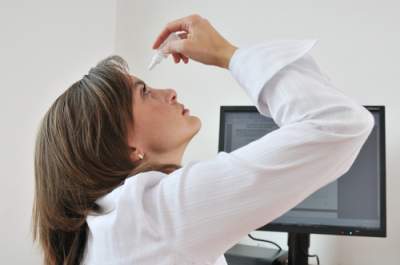 A TV may be hard to “put” sight.
A TV may be hard to “put” sight.
To visual acuity did not decrease with age or under the influence of external negative factors, we should pay attention to the rules of movies and TV shows.
Evening in front of the TV is a traditional pastime for many people seeking to escape and relax after a hard day’s work. But whether to relax their eyes (especially if the work was closely linked with a computer or small print manuals)? In order not to harm their health and get pleasure from viewing the new movie, be aware of simple precautions.
As you know, when viewing objects eyes are in constant motion. Looking at the moving image, the eyeballs have a significant load. To evaluate it objectively, you should pay attention to your own posture. As we sit in front of the TV? Conveniently located in a comfortable chair at a sufficient distance from the screen, scorches on the floor, stretched on the sofa…
Right is a body position in which the head forms a straight line with the spine, otherwise after a while the skeletal muscles are overworked and start to ache. Also important is the distance to the screen. Few people pay attention to it, especially in small apartments, where lack of space is automatically dictates the rules of arrangement of furniture. But too much distance causes overexertion of the eye muscles, especially at the lower visual acuity: a person is forced to stare at the screen, to squint, to squint, but if it’s too small, it gradually leads to the development of myopia, or violations of the accommodative process.
In any case you should not allow young children and students to watch the TV for a long time. Especially harmful to include it, when the kid does his homework. Our brain can fully concentrate on just one activity, so any distraction will distract the child from homework. In addition, he will translate the look of the textbook on the screen and his eyes will be inevitably overloaded.
The time factor is of great importance. If admission is limited to the duration of the movie, in front of the TV you can quietly spend most of the day. This inevitably develops various visual disturbances, and often myopia.
In addition to physical overload, the eyes of fans of the TV suffer from a chronic lack of fresh air. It is no secret that the ventilation in older homes is often ineffective, and the airing, many people simply forget, so at the weekend, during continuous viewing of TV shows, all the organs of our body not getting enough oxygen. Among the consequences of this “starvation” is one of the foremost is the decrease in visual acuity.
To prevent unwanted effects, it is necessary to limit the time of TV viewing duration of standard film (about 1.5 hours), to allow for television children only at weekends, for 20-30 minutes, and don’t forget about regular exercises for the eyes, different ways of relaxing and switching attention.
Movies are less harmful to the eyes, because the flashing of film frames on the big screen stimulates the retina to a greater extent than a change in the image on the screen or matrix of the TV. In addition, in the modern cinema set climate control to ensure optimal room temperature and a constant flow of conditioned air.
To avoid unpleasant consequences, when you visit the cinema should take place according to individual needs: in case of myopia, it is better to get closer to the screen and when the hyperopia is to move away. If your doctor has prescribed constant wearing of glasses or contact lenses, it is not necessary to remove them. It is desirable that the place was in the center of the auditorium, not on the edge.
While watching the film, it is undesirable to tilt the head – it should be on one line with the spine.
It is desirable to monitor the uniformity of breathing and blinking often, as a result, the tissue of the eyeballs will be evenly to hydrate and get enough oxygen.
During a break between batches of film (or long monotonous scenes), you can cover your eyes, do some simple relaxation exercises or lightly massage the eyelids.








